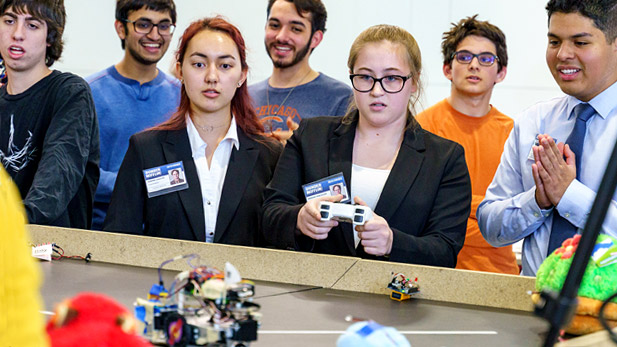Students Score Points with Robots in 'Elemental Extravaganza'
Thursday, December 05, 2019

First-year electrical and computer engineering students had fun showcasing robots that squared off in laser-tag matches as part of an Engineering Practice course that reinforced engineering principles that will be useful throughout their careers.
The lack of computer programming experience didn’t keep a team of three first-year computer engineering majors from creating a robot that captured top honors in a fun-filled competition that culminated a fall quarter course introducing students to the principles of engineering.
The competitive spirit of electrical and computer engineering students was on full display in this fall’s Elemental Extravaganza Challenge. Teams programmed autonomously controlled robots to capture elements such as fire, water, electricity, air, and plants. Each element was assigned a different point total.
After setting a course to determine which element to select, a team’s robot switched to remote-control mode and squared off in a laser-tag match against an opposing robot on the playing board.
Points were awarded based upon the point value of each element and the number of successful laser-tag strikes during each round of competition. Starting with 29 teams, the top-scoring robots in each round advanced until an overall champion was crowned.
Along the way teams learned valuable lessons about design and production, teamwork, written and oral communications, and lots of trial-and-error practice.
“This competition wrapped up the Rose-Hulman educational experience in a nice introductory course,” says ECE Department head Mario Simoni, one of the course instructors. “During the next four years students are going to be challenged to learn something new, while stretching themselves personally and professionally. However, with perseverance they will make it.”
That certainly was the case for members of the winning Power House team of computer engineering students Charlie Falcone of Wilmette, Ill.; Arvind Krishnan of Poway, Calif.; and Ryan Su of Guangzhou, China. They came up with a game strategy that worked successfully to be the top-scoring team in each round of competition.
“We were shocked with how well we did. A couple of weeks ago our robot was lifeless and in shambles,” admits Krishnan. “None of us had any previous experience in programming a robot. However, we worked together to develop a plan and everything came together at the end. Then, when it came down to competition, we got more self-confidence in our robot and our abilities as we kept on winning.”
Falcone adds, “Teamwork was the key, and we never got stressed out. We worked well together, which was pretty remarkable since we didn’t know each other before starting this class and school year.”
Finishing a close second was the Tied Shoelaces team of electrical engineering students Tyler Phillips of Decatur, Ill., and Ty Robert of Montgomery, Texas, and computer engineering major Ethan Powell of Wildwood, Mo.
The robot’s performance didn’t impact the grades of any student team member. This is a practical class exercise developed by ECE faculty members Ed Doering, Daniel Chang and Simoni to reinforce lessons taught during the 10-week Engineering Practice course.
The competitive spirit of electrical and computer engineering students was on full display in this fall’s Elemental Extravaganza Challenge. Teams programmed autonomously controlled robots to capture elements such as fire, water, electricity, air, and plants. Each element was assigned a different point total.
After setting a course to determine which element to select, a team’s robot switched to remote-control mode and squared off in a laser-tag match against an opposing robot on the playing board.
Points were awarded based upon the point value of each element and the number of successful laser-tag strikes during each round of competition. Starting with 29 teams, the top-scoring robots in each round advanced until an overall champion was crowned.
Along the way teams learned valuable lessons about design and production, teamwork, written and oral communications, and lots of trial-and-error practice.
“This competition wrapped up the Rose-Hulman educational experience in a nice introductory course,” says ECE Department head Mario Simoni, one of the course instructors. “During the next four years students are going to be challenged to learn something new, while stretching themselves personally and professionally. However, with perseverance they will make it.”
That certainly was the case for members of the winning Power House team of computer engineering students Charlie Falcone of Wilmette, Ill.; Arvind Krishnan of Poway, Calif.; and Ryan Su of Guangzhou, China. They came up with a game strategy that worked successfully to be the top-scoring team in each round of competition.
“We were shocked with how well we did. A couple of weeks ago our robot was lifeless and in shambles,” admits Krishnan. “None of us had any previous experience in programming a robot. However, we worked together to develop a plan and everything came together at the end. Then, when it came down to competition, we got more self-confidence in our robot and our abilities as we kept on winning.”
Falcone adds, “Teamwork was the key, and we never got stressed out. We worked well together, which was pretty remarkable since we didn’t know each other before starting this class and school year.”
Finishing a close second was the Tied Shoelaces team of electrical engineering students Tyler Phillips of Decatur, Ill., and Ty Robert of Montgomery, Texas, and computer engineering major Ethan Powell of Wildwood, Mo.
The robot’s performance didn’t impact the grades of any student team member. This is a practical class exercise developed by ECE faculty members Ed Doering, Daniel Chang and Simoni to reinforce lessons taught during the 10-week Engineering Practice course.